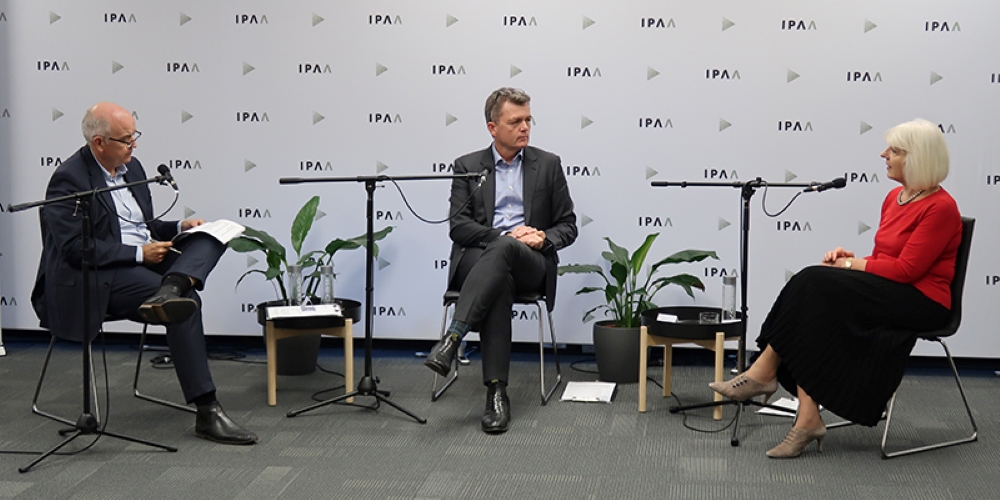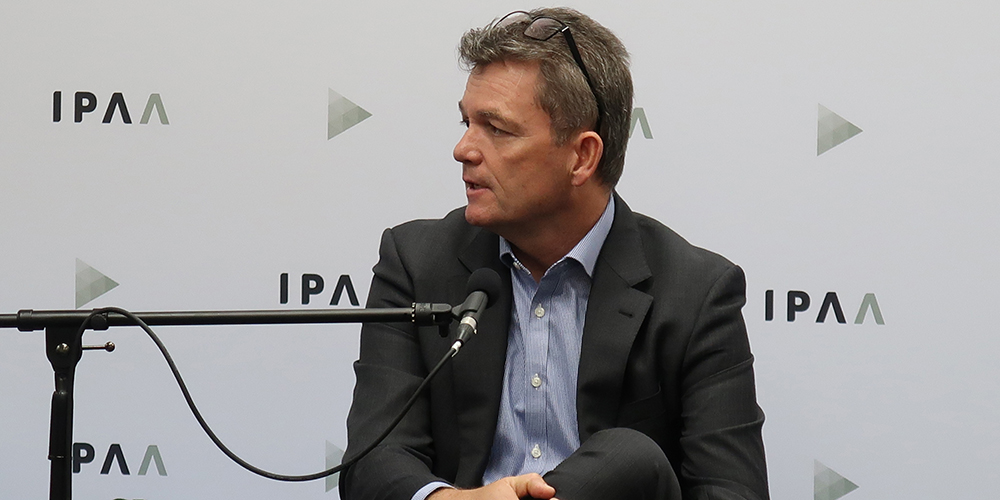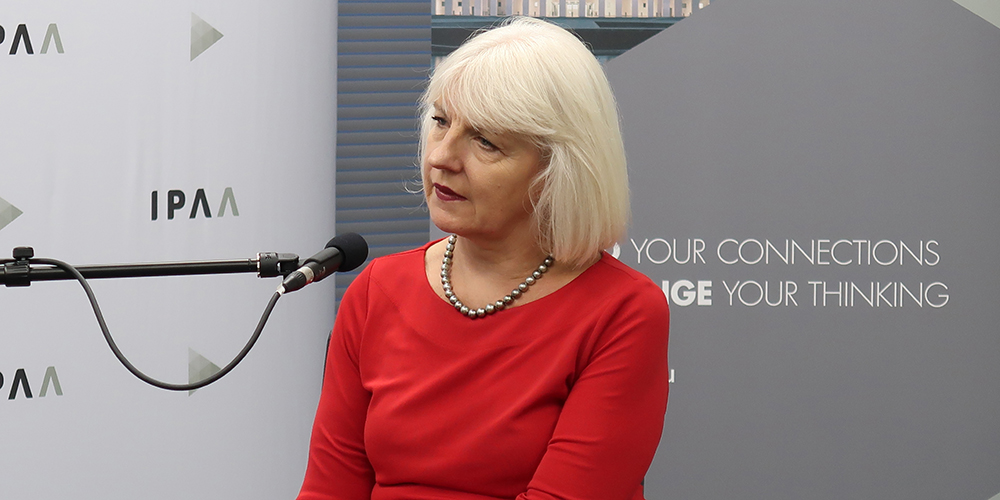One constant of the bushfire recovery? We listen.

Christine Morgan (CEO, National Mental Health Commission and National Suicide Prevention Advisor to the Prime Minister) in conversation with Andrew Colvin APM OAM (National Coordinator, National Bushfire Recovery Agency) and David Pembroke (Founder and CEO, contentgroup).
The mental health of Australians impacted by the devastating bushfires of late 2019 and early 2020 was recently the key topic of conversation between Andrew Colvin OAM APM and Christine Morgan.
Andrew is the National Coordinator for the National Bushfire Recovery Agency, and Christine is the Chief Executive Officer for the National Mental Health Commission and National Suicide Prevention Adviser to the Prime Minister.
Andrew and Christine spoke with David Pembroke, the Founder and Chief Executive Officer of contentgroup, for the Work with Purpose podcast.
Mental health front and centre of bushfire recovery
Very early on in his role as National Coordinator of the bushfire recovery, Andrew spoke with Christine about what they could do to help put lives back together, and help people with their own wellbeing.
Christine recalled how they very quickly determined the really key thing was “to go to people where they were at, and put it in a language and a way that they could get to — rather than expecting them to come knocking on our doors.”
Andrew said that the key lesson for the bushfire recovery journey was that it was about listening:
“It’s listening to what will work and understanding that my needs will be different to Christine’s, it would be different to yours.
And tailoring programs that have the flexibility and the agility to actually respond to the needs.

Andrew Colvin APM OAM, National Coordinator, National Bushfire Recovery Agency.
Andrew went on to say:
“We in government can sometimes be very good at pulling big levers that release funds and put policy on the ground.
But we’re not as good — because it’s hard — at seeing ‘how does that policy actually change someone’s life, how has it made a difference?’.
And that was the thing that came home to me — I’ve never been concerned that were wasn’t enough intent or even dollars available to help this problem, of course, you can always do more, you can always do it differently — I’ve always been concerned about: ‘How does it actually penetrate?’ and ‘Are we looking at it from the end-user, the end person who needs this help?’; ‘Are we looking at if from their perspective rather than from the top-down?’. I think that’s a fundamental shift in the way we have to see it.”
He described how they had found ways to penetrate the issues that the victims of the bushfires were facing, ways that weren’t expensive:
“Organising roundtables at the local coffee shop, organising events at the pub if that’s where they needed to be.
Wherever people are comfortable to come together and talk is probably the first point: because then the next step is not so hard, and the next step after that’s not so hard.
But taking that first step doesn’t need to be going and having a GP consult. It might just be saying, ‘You know what, I’m finding it tough today’, or ‘This week has been hard and ‘I’m tired of grants, and I’m tired of looking at my burnt shed, and I just need to do something else’.
That’s where we need to look at this.”

Christine Morgan, CEO, National Mental Health Commission and National Suicide Prevention Advisor to the Prime Minister.
Words have power
Picking up on what Andrew’s point, Christine observed that:
“You can’t actually manage somebody’s mental health, or their mental health challenges, until you can help them actually put it into words…
Because it manifests itself in the way you think, the way you feel, your behaviours. And that’s really challenging for people to come through to.
So I think that is the critical difference between being able to start the journey with somebody around mental health challenges, as distinct from physical health ones.”
Christine went on to explain how:
“I need to be able to hear it in the way you describe it and connect. And you need to feel safe to tell me about it.
And then we need to find a way that’s going to engage you in that process of getting better.”
Normalising the conversation when the trauma is still very real
Thinking about the issue of mental health twelve months after his first conversation with bushfire victims, Andrew said that they needed “to normalise the conversation more than we have”.
“When I look back twelve months now, I think I was having more raw conversations with people about their health and wellbeing because the fires were still on, and it was very real.
Twelve months down the track, the conversations aren’t the same. They’re still there…
The conversation is still a normal conversation and that’s a positive — people aren’t afraid to sit in front of their colleagues in a community group and say that, which is positive.
But it concerns me, for instance, you know just last week I was up in… north-west New South Wales, a small town, and you know, I’ve still got farmers who are breaking down in tears recounting the story. And this is sixteen months after the fire has gone through. So that tells me that the trauma is real, it’s still ongoing, and people don’t quite feel that they’ve been able to deal with it.
So we’ve got to normalise that conversation.”
It’s okay to need people
Christine reflected on the communication challenge they faced with the arrival on the coronavirus pandemic in early 2020.
“We had this big kind of comms and grant piece all around ‘How do we rebuild communities?’. And then suddenly we were being told ‘stay away from each other and don’t do it’.
Which was what effectively birthed the need to say, ‘Let’s get rid of social distancing as a phrase, and talk about physical distancing with social connection’, because we were really trying to find a way… where we kept that real sense of, ‘It was my community and it was other people who I could rely on who got me through this’.
And that’s a fundamental part also of good mental health.”
She spoke about how the message was reframed, saying to people:
“Don’t forget you need each other. Don’t forget.
And in fact, go that step further — think of those people who may be lonely, think of those people who may be in need, proactively reach out to them.”
By the end of 2020, Christine said people were more conscious of doing that and in conversation with Andrew said:
“That might be something we need to keep putting into the conversation to help normalise, it’s okay to need people — it’s part of good mental health and connectedness.
I think that’s another part of the story we need to weave in.”
WORK WITH PURPOSE is produced in partnership between contentgroup and IPAA ACT, with the support of the Australian Public Service Commission.
The podcast can be accessed from the link below, and is also available on Spotify, SoundCloud and iTunes.
